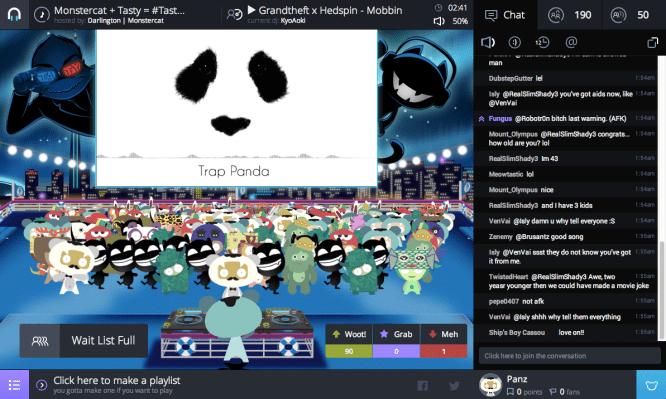It was the licensing that killed Turntable.fm — thousands of uploaded songs, each one a tiny stream of coins tingling out of the company’s coffers. Or maybe it was the impermanence of the experience, the thing that it lacked that could have kept people coming back.
Whatever the reason, the music discovery space has been left with a clever avatar-sized hole. One that two-year-old discovery survive and clear turntable.fm homage Plug.DJ hopes to fill. Today, the company is announcing that it’s received $1.25M in seed funding led by Javelin Venture partners to expand its team and boost development of the product.
The service was founded by several people including 20-year DJ vet Steven Sacks, who built much of the front end experience of the site and musician Alex Reinlieb, who serves as the company’s CEO.
The experience of Plug.DJ is very similar to Turntable.fm, at least superficially. There are rooms which users can create around share interests in kinds of music. There are the funny avatars and there is the DJ stand with an audience watching. Once you get beyond the obvious similarities however, you start to see a fairly engaged and interested audience. Browsing the site’s postings and rooms yields tons of comments from a fairly supportive community that engages with both the creators and each other.
That sense of community is what Reinlieb says he believes is the difference between Plug.DJ and sites like Turntable.fm. Where the latter always left you wishing you had a reason to check in, the sense of community on Plug.DJ is what creates the positive feedback loop that pulls people back to their shared rooms.
Even a superficial delve into the comments sections of the site, for instance, lead to chatter about the communities that have sprung up around rooms on the site. People note that they’ve gotten together outside of the rooms and made friends that they wouldn’t have otherwise, and express tolerance for some site stability and expansion issues.
Reinlieb won’t say exactly how many users Plug.DJ has, noting only that it’s ‘several million’. Those millions are spread over about 190 countries around the world and feature a highly engaged audience, if the company’s metrics are to be believed. The average Plug.DJ user is on the site for over an hour per visit — sessions which can add up to 5-10 hours per week, per user. Those numbers are extremely high for any service, and even more so for one centered around participation in a shared event.
“It’s not a novelty to them,” says Reinlieb of the Plug.DJ community, “It’s a very, very sticky experience.”
The social aspects of the site focus on using Facebook and other networks like Twitter to connect users on and off the site. People create rooms on the site, says Reinlieb, which become communities of users that get together there and elsewhere. Instead of spending the company’s sparse recourses on moderating, they shipped an update to the platform that allows individual users to be appointed as ‘community moderators’ called Brand Ambassadors. These roughly 35 ambassadors help to moderate the content and user groups on the site, which are organized into rooms with ‘nightclub’ allegories. Each room has its own DJs, bouncers, managers and more which can fulfill their own roles. Assigning ownership and a structure to the rooms helps instill a feeling of ownership, says Reinlieb.
Part of the Plug.DJ puzzle is that the site started where Turntable.fm ended when it came to music licensing. There is no music uploading or licensing model on Plug.DJ, instead, the service utilizes pre-licensed music libraries from Soundcloud and YouTube. This neatly dodges the issues surrounding royalties and fees, while tapping into what have already become the de-facto music destinations. YouTube alone is already among the most popular music services, if not the most popular, online. Why duplicate those efforts in their own library.
The funding will help Plug.DJ expand the team, which is where most of the money will be going. They’ve bootstrapped ‘as long as possible’, notes Reinlieb, but now need money for engineers to expand and ostensibly to fix those stability issues.
Using the service does incite some of that same feeling of cleverness that attracted people to Turntable.fm. Spinning in front of a crowd of people, even if they’re virtual, has its own appeal. And if you’re going to tap into a feedback loop to get people to continue coming back to your service — and spending tons of time there — there are worse ways to do it than fostering a sense of community.
But there’s a big difference between a few million users and a sustainable business, and Reinlieb only loosely sketches out ideas for ‘connecting’ artists, labels, brands and fans when we ask about monetization. Still, it has a bit of cash now and a very highly engaged community, so let’s see what happens.
Image Credit: Amie Lee
